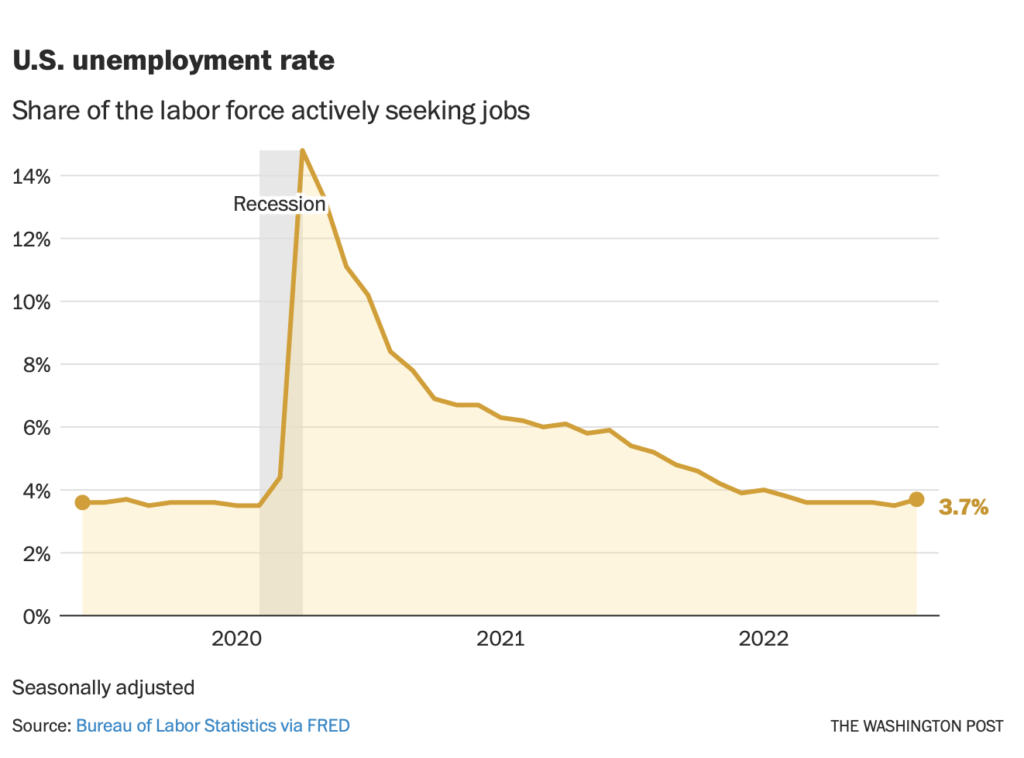Good morning.
Saturday in Whitewater will see scattered thundershowers with high of 80. Sunrise is 6:22 AM and sunset 7:25 PM for 13h 02m 20s of daytime. The moon is a waxing crescent with 48% of its visible disk illuminated.
On this day in 1939, France, the United Kingdom, New Zealand, and Australia declare war on Germany after the invasion of Poland, forming the Allied nations.
Understanding the difference between mere production and productivity is critical to measuring meaningful economic achievement. While production is the manufacture (or conversion) of raw materials into goods or services, productivity is the making of those goods or the provision of those services more efficiently than in a prior period. It’s an easy distinction, and most people grasp it it well and intuitively. As it turns out, however, some well-placed executives have embarrassing trouble understanding either of the concepts.
Josh Barro, writing at his newsletter Very Serious, describes a story in the New York Times about Washington Post publisher Fred Ryan. Ryan wants his reporters to be in the office more often, and he’s been pondering ways to compel them to come back. As Barro observes, this shows that Ryan doesn’t understand production or productivity at his own paper — despite having been the Post publisher for years, and despite having been appointed by businessman-billionaire Jeff Bezos (owner of the Post).
First Ryan’s plan, and then Barro’s spot-on critique.
Reporting on Ryan’s Plan:
He has expressed his belief to members of his leadership team that there were numerous low performers in the newsroom who needed to be managed out…
Mr. Ryan has expressed annoyance with senior newsroom leaders at what he sees as a lack of productivity by some journalists at the paper. Last fall, he asked for the company’s chief information officer to pull records on which days employees held videoconference meetings, as a way to judge production levels, and found that fewer meetings occurred on Fridays, according to two people with knowledge of the matter.
He has also grown increasingly frustrated that some Post staff members are still not in the office at least three days a week, the company’s policy.
In recent weeks, Mr. Ryan asked for disciplinary letters to be drafted and sent to employees who had not made any appearance in the office this year, according to three people with knowledge of the discussions. He ultimately decided that the letters should not be sent, and that the people should be called instead.
If this reporting should be accurate, it suggests that Ryan doesn’t understand a key aspect of production or productivity in his own industry.
Having observed other managerial failures at the Post from the outside (I’ve never worked there) it would not surprise me in the least if it’s possible to identify dozens of staff who could be cut with little impact to the quality of the news report.
But the thing about these low performers is that middle managers almost always already know who they are. And especially at a newspaper, it’s not that hard to tell who’s producing and who isn’t. It’s not as simple as looking at how many words per week someone is filing, but if you have a writer who’s producing very little copy, there is generally either an identifiable reason that writer is highly valuable — does she do months-long investigations that break huge news and win awards? — or there isn’t.
And that’s what makes Ryan’s apparent fixation on videoconference meeting schedules and badge scans pretty odd.
There are valid reasons you might want workers in the office (collaboration, supervision, etc.) and also valid reasons not to force them back (competitors are more flexible, and if you aren’t, some strong performers will quit). But for evaluating the performance of individual employees, you can look directly at their actual work, rather than relying on their physical presence in the office as a proxy.
So the whole thing kind of seems like the worst of both worlds, from a personnel-management perspective: antagonizing the staff by scolding them over their physical presence, while failing to actually weed out the staff whose performance is sub-par.
(Emphasis added.)
For reporting that leads to publishable writing, the measure is what you produce and how efficiently are you produce it. If strong and efficient production of news stories comes from reporters who do their work in treehouses, VW buses, or gin joints, so be it.
Does Ryan understand his product? Readers want news, features, and commentary from the Post, and they look for those written words online or in newsprint. Where the stories are drafted doesn’t matter. Showing up in the office only matters if that location is the place of greatest production and productivity for reporters’ work. If it’s not the place of greatest production, then compulsion of workers to the office only leads to lesser production and productivity.
In any event, for writing, it’s what lands on the page that matters to readers. Ryan already knows what’s on the pages of his paper; he doesn’t need reporters’ office time to measure production.
Wisconsin’s recent dragonfly swarms are the largest seen in years:



